|
|
|
Sort Order |
|
|
|
Items / Page
|
|
|
|
|
|
|
| Srl | Item |
| 1 |
ID:
179809


|
|
|
|
|
| Summary/Abstract |
China's global proliferation of psychological warfare, operating in small signatures and low visibility, reflects a cultural continuity of ancient strategic thought and martial philosophy. Contemporary analysis explains how China's attempts to coerce and persuade its target entities work through systematic deception and perception management to achieve its authoritarian objectives. However, there are gaps in the understanding of these operations as distinct from conventional statecraft, and in the configuration and mechanism of actions constituting bottom-up change toward subduing the enemy without fighting. To guide the analysis of China's psychological warfare in an organized manner, an explanatory framework of three cultural drivers—allusion (anshi), reasoning (douzhi) and luring (yinyou)—and six tactics—induction (youdao), coercion (xiepo), sentiment (qinggan), hoax (xirao), persuasion (ganhua) and disguise (qiaozhuang)—were devised. It is argued that the deeply rooted ideational and materially embodied dynamics continue to exploit western social vulnerabilities and the open nature of democratic institutions by introducing policy confusion, assimilation and division. However, failing to recognise these as normative social practices will result in misguided counter-measures aimed at transforming the communist system into a capitalist democracy, triggering domestic social unrest, or discrediting the CCP leadership in the eyes of the world and the Chinese people.
|
|
|
|
|
|
|
|
|
|
|
|
|
|
|
|
| 2 |
ID:
179818
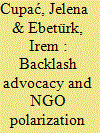

|
|
|
|
|
| Summary/Abstract |
The article observes that women's rights politics in the United Nations are caught in full-scale polarization between feminist and conservative non-governmental organizations (NGOs), particularly visible in their fights over institutional spaces and language. It then sets out to elucidate the process by which this polarization came about. It first ties it to specific reasons for which conservative NGOs entered the UN; namely, their intent to halt and reverse the progress of women's rights. Next, the article observes that this intent has given birth to a specific style of conservative NGOs' advocacy: backlash advocacy. This advocacy differs from regular advocacy in that it does not target only UN decision-makers, but also a rival NGO group and its normative record. Polarization results from feminist NGOs' defensively reciprocating this attack. The article contributes to the literature on international organization (IO)–NGO relations by specifying why conservative NGOs, considered unlikely IO utilizers, end up actively using the UN and by showing that this diversification in NGOs' utilization of the UN can have detrimental rather than positive institutional effects. The article also invites feminist NGOs to be more aware of the political dynamic that now entraps them, and to tailor their future strategies accordingly.
|
|
|
|
|
|
|
|
|
|
|
|
|
|
|
|
| 3 |
ID:
179807


|
|
|
|
|
| Summary/Abstract |
Studies of the Middle East following the Arab Spring have concluded that ‘repression works’, especially in the oil- and gas-rich countries of the Gulf. Drawing on primary materials collected during fieldwork trips to Bahrain, the United States and Britain, this article nuances the ‘repression effect’ by tracing the emergence of a transnational Bahraini opposition, mapping the relationships and joint activities between domestic and exiled Bahraini groups, international NGOs and western policy-makers. It finds that even in the context of domestic repression and continuing ideological divides within Bahrain's opposition, transnational networks have not only sustained opposition organizations, but also maintained access to foreign policy-makers, producing repeated criticisms of the Bahraini regime and legal challenges to ruling elites who visit western states. The successes of this advocacy are modest: while it has not drastically reshaped the domestic state–society relationship, it has created significant costs for the Bahraini regime and damaged Bahrain's international brand. As a result, state and opposition networks now compete for influence over western policy-makers: international ‘arenas of advocacy’—such as the UK parliament, US Congress, UNHRC and European Parliament—have now become ‘arenas of contestation’, as state and opposition narratives of Bahraini politics, filtered through western policy-makers, play out during debates over foreign policy towards Bahrain. The article positions transnational activism as a direct outcome of the ‘repression effect’, highlighting ongoing contests for influence between state and society occurring in international and transnational spaces, even as the domestic scope for opposition mobilization remains highly restricted.
|
|
|
|
|
|
|
|
|
|
|
|
|
|
|
|
| 4 |
ID:
179812
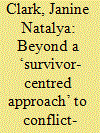

|
|
|
|
|
| Summary/Abstract |
In Resolution 2467 (2019), the most recent addition to the Women, Peace and Security (WPS) agenda, the UN Security Council embraced the idea of a ‘survivor-centred approach’ to preventing and responding to conflict-related sexual violence. While this terminology is now widely used in international policy circles, the general lack of critical reflection on the concept of survivor-centrism is striking. Addressing this gap, this interdisciplinary article seeks to demonstrate that a survivor-centred approach, by itself, is too narrow. It utilizes the ecological concept of connectivity—which refers to connections that enable and facilitate vital ecological processes—and repurposes it in a social science context to develop the article's core argument: that survivor-centred discourse marginalizes, or neglects, the fundamental webs of connectivity in which the everyday lives of those who have suffered conflict-related sexual violence are intricately interwoven. The article draws on qualitative interviews with victims/survivors of conflict-related sexual violence in Bosnia and Herzegovina, Colombia and Uganda to empirically develop two particular ‘connectivity critiques’ of survivor-centred discourse, focused on resources and health respectively. Ultimately, it is not advocating the abandonment of a survivor-centred approach, but, rather, a social-ecological reframing of it. It presents connectivity as a new conceptual approach for thinking about and dealing with conflict-related sexual violence.
|
|
|
|
|
|
|
|
|
|
|
|
|
|
|
|
| 5 |
ID:
179811


|
|
|
|
|
| Summary/Abstract |
One of President Joseph Biden's foreign policy priorities is to ‘renew’ and ‘strengthen’ the United States' alliances, as they were perceived to have been ‘undermined’ during the Trump administration, which regularly expressed concern that allies were free-riding on the United States' military capability. Yet the broad range of threats states face in the contemporary context suggests that security assistance from allies no longer only—or even primarily—comes in the form of military capability. We consider whether there is a need to rethink understandings of how alliance relationships are managed, particularly how the goals—or strategic burdens—of alliances are understood, how allies contribute to those burdens, and how influence is exercised within alliances. We do this by analysing how the United States–Australia and Australia–New Zealand alliances operate in the Pacific islands. Our focus on the Pacific islands reflects the United States' perception that the region plays a ‘critical’ role in helping to ‘preserve a free and open Indo-Pacific region’. We conclude that these understandings need to be rethought, particularly in the Pacific islands, where meeting non-traditional security challenges such as economic, social and environmental issues, is important to advancing the United States, Australia and New Zealand's shared strategic goal of remaining the region's primary security partners and ensuring that no power hostile to their interests establishes a strategic foothold.
|
|
|
|
|
|
|
|
|
|
|
|
|
|
|
|
| 6 |
ID:
179806
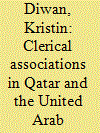

|
|
|
|
|
| Summary/Abstract |
In the wake of the 2011 Arab uprisings, the wealthy Gulf states of Qatar and the United Arab Emirates began hosting and establishing associations of influential Islamic scholars. These clerical associations, the Doha-based International Union for Muslim Scholars (IUMS) and the Abu Dhabi-based Muslim Council of Elders (MCE) and associated peace initiatives, have afforded a platform for more credibly entering into religious and political debates, for cultivating new networks of influence among Muslim publics, and engaging non-Islamic countries and organizations. Drawing upon interviews and primary resources, this study investigates this exercise in religious statecraft, comparing the discourse and policy interventions of these associations, and analysing their improbable challenge to the predominant religious terms set by the traditional heavyweight in the Gulf, Saudi Arabia. It finds that the effectiveness, or resonance, of these religious soft power projects depends upon credibility—their alignment with national religious traditions and policy directions—and positioning—the targeting of particular audiences and stakeholders. It concludes that the UAE holds certain advantages over Qatar in its soft power positioning in the current nationalist moment, as states gain ground over transnational Islamic movements and relations with powers such as India, Russia, China and Israel—all hostile to independent Islamic movements—gain in importance. Policy-makers acknowledging the surprising hard power projection of these small states through military interventions and economic leverage may benefit from this study of their new religious soft power influence.
|
|
|
|
|
|
|
|
|
|
|
|
|
|
|
|
| 7 |
ID:
179808


|
|
|
|
|
| Summary/Abstract |
All Arab states, including the Gulf states, are regularly considered an anomaly in International Relations: allegedly artificially created, lacking clear identity, borders and sovereignty. We challenge this assertion by looking at one dimension of sovereignty often overlooked: the air space. We measure this assertion along the classical lines of sovereignty: do the states have the institutions, regulations and capacity to manage their air space, do they use it for economic and diplomatic purposes, do they have the means to conduct war in it, and does it feature in their national identity? We find that particularly since 1990, the Gulf States have affirmed their sovereignty markedly in all these areas. These findings show two things: that sovereignty can be a feature of a state regardless of the nature of its creation, and that it can be affirmed in a space previously overlooked, the air.
|
|
|
|
|
|
|
|
|
|
|
|
|
|
|
|
| 8 |
ID:
179819
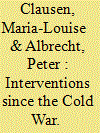

|
|
|
|
|
| Summary/Abstract |
Through the lens of security sector reform, this article explores shifts in international interventions since the Cold War. Identifying three phases, it traces the global North's failure to transform fragile states into liberal democratic polities and changes to intervention practices in response to that failure. Immediately after the Cold War, an unfettered belief in the liberal peace thesis, and its global applicability, drove interventions that sought to establish an integrated liberal internationalist system of states shaped by mutuality. This changed with 9/11, shifting the focus towards extensive statebuilding exercises to replace, by force if necessary, security sectors and reconstruct failed states as liberal democracies. The current phase reflects lost faith in the global North's transformative potential following experiences in Iraq and Afghanistan. New forms of intervention from a distance have emerged, relying on delegation to technology and militaries of the global South. This type of intervention allows the global North to maintain a sense of influence while shifting the burden of intervention onto the global South's populations and militaries—and foreclosing comprehensive statebuilding. The global North can no longer claim to act on behalf of universally applicable norms, but alternatives have yet to materialize, leaving interventions in an ideological limbo.
|
|
|
|
|
|
|
|
|
|
|
|
|
|
|
|
| 9 |
ID:
179804


|
|
|
|
|
| Summary/Abstract |
Arabian Peninsula politics are in a period of enormous transformation. In the context of a new generation of rulers seeking legitimacy through ambitious foreign policy regimes, shifting relations with Iran, the 2017–2021 Qatar crisis, and ongoing conflict in Yemen, this article introduces the July 2021 special section of International Affairs, which examines how the Arab states of the Gulf are adapting to these new realities. Questions addressed include: how have transnational identities been manipulated by states during regional disputes? How have oil and gas revenues been redirected to build up religious soft power and enhance state branding efforts? In an increasingly authoritarian world, how has transnational repression interacted with politicized diasporas to impact opposition mobilization? And, how do disputes over airspace help us understand the process of sovereignty-building in the modern Middle East? In pursuing these questions, the special section challenges the particularism still apparent in many analyses of the Gulf region, and seeks to bridge International Relations with fieldwork-based Gulf studies. The research presented in the section highlights new findings within contemporary research on the Gulf that will be of interest both to policy-makers and others seeking to understand the long-term sustainability and balance of power in this critical region.
|
|
|
|
|
|
|
|
|
|
|
|
|
|
|
|
| 10 |
ID:
179821
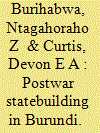

|
|
|
|
|
| Summary/Abstract |
The widespread enthusiasm for internationally-supported liberal statebuilding since the 1990s has become much more tempered, due in part to the mixed record of postwar liberal statebuilding. Over time, many postwar countries have adopted more authoritarian statebuilding trajectories, despite the fact that negotiated peace agreements tend to reflect liberal principles. This is often attributed to ‘liberal’ international actors encountering resistant ‘illiberal’ domestic elites. The postwar statebuilding trajectory in Burundi appears to fit this dominant narrative, with the ruling party, the Conseil National pour la Défense de la Démocratie-Forces pour la Défense de la Démocratie (CNDD-FDD), deviating from some of the liberal principles that underpinned the Burundian peace agreement. Drawing on a detailed analysis of the internal politics of Burundi's ruling party, we show that this account is flawed. We question overly simplified accounts of ‘illiberal’ ruling party elites and we argue that tensions, competition and fragmentation within the ruling party were decisive in Burundi's statebuilding path. Rather than seeing Burundi as an inevitable failure of liberal statebuilding, we highlight how there was some commitment to liberal principles even within the ruling party. Internal struggles within the ruling CNDD-FDD led to current outcomes in Burundi, which should not be interpreted as predestined or definitive. We show that understanding the complexities, diversities and contingencies within ruling parties opens new spaces for thinking about the creation and recreation of political orders after war.
|
|
|
|
|
|
|
|
|
|
|
|
|
|
|
|
| 11 |
ID:
179816
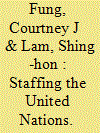

|
|
|
|
|
| Summary/Abstract |
A developing public commentary views China as exerting influence in international organizations to legitimize and disseminate PRC foreign policy values and interests. This article examines an understudied source identified by PRC elites to promote influence in the United Nations system: dispatching PRC nationals as international civil servants, specifically in a targeted pursuit of executive leadership positions. Using decades of UN staffing data, we find that apart from Russia, China holds the fewest executive leadership posts among the aspiring and permanent members of the UN Security Council. Moreover, China is yet to lead an agency addressing international security matters. US and European staff contributions are significantly higher at all staffing levels of the international civil service. Still, the data shows that China made modest, targeted gains in most specialized UN agencies, and agencies headed by PRC nationals show faster increases in PRC staff members, though all base numbers were low. We draw from Chinese-language sources to discuss issues facing China in increasing its international civil service numbers, affecting the country's ability to shape global governance.
|
|
|
|
|
|
|
|
|
|
|
|
|
|
|
|
| 12 |
ID:
179805


|
|
|
|
|
| Summary/Abstract |
What does the recent Gulf diplomatic crisis of June 2017 to January 2021 mean for the future of the region's signature transnationalism: the khalījī [Gulf] identity? This identity narrative encompasses the shared sociocultural backgrounds of the people of the region, but the unprecedented separations, caused by the regional crisis, may have shifted the discourse of belonging in the Gulf. To investigate the impact of the recent crisis on regional identity narratives, this article explores the new National Museum of Qatar's presentation of Qatar's political history from 1848 to 1868, as well as museum-goers' reactions to this presentation, through original fieldwork and ethnographic interviews with Qatari and expatriate residents. The analysis highlights the museum's purposeful portrayal of parallels between intra-Gulf conflicts of the past and the recent crisis, a presentational choice that stands in sharp contrast to previous regional norms of tactful diplomacy. Further, museum-goers recognized the linguistic and symbolic parallels, provoking both engagement with and rejection of the concept of khalījī identity. In summary, this analysis suggests that the crisis has shifted the norms of discourse in the region in ways that may make social reconciliation difficult, even as political bonds resume. As the region moves forward from crisis, policy-makers should reduce the tension between national and transnational identity narratives by creating space for the renewal of khalījī ties.
|
|
|
|
|
|
|
|
|
|
|
|
|
|
|
|
| 13 |
ID:
179814


|
|
|
|
|
| Summary/Abstract |
Over the past fifteen years, Turkey has tried to achieve the status of global actor. Enhancing ties with the global South has been one policy to achieve this objective. The article aims to analyse the changing trajectory of Ankara's approach towards a non-traditional orientation of its foreign policy, the southern dimension, by focusing on the determinants of the Justice and Development Party's (AKP) foreign policy in the last decade. The key argument is that the southern orientation of Turkish foreign policy has lost its constructive and developmental direction due to the complex interactions between the regional crisis in Turkey's neighborhood and domestic democratic backsliding, coupled with Erdogan's executive centralization, especially after the failed coup of 2016. As a major finding, the agenda securitization and the increased personalization of Turkey's domestic and international agenda have polluted an attractive foreign policy, even in non-priority regional areas.
|
|
|
|
|
|
|
|
|
|
|
|
|
|
|
|
| 14 |
ID:
179813
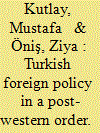

|
|
|
|
|
| Summary/Abstract |
Turkish foreign policy has dramatically transformed over the last two decades. In the first decade of the Justice and Development Party's (AKP) rule, the ‘logic of interdependence’ constituted the driving motive of Turkish foreign policy. In the second decade, however, the ‘logic of interdependence’ and the soft power-driven ‘mediator–integrator’ role were gradually replaced with a quest for ‘strategic autonomy’, accompanied by interventionism, unilateralism and coercive diplomacy. This article explores the causes of this dramatic shift. We argue that ‘strategic autonomy’, which goes beyond a moderate level of status-seeking compatible with Turkey's material power credentials, has a double connotation in the Turkish context. First, it constitutes a framework for the Turkish ruling elite to align with the non-western great powers and balance the US-led hierarchical order. Second, and more importantly, it serves as a legitimating foreign policy discourse for the government to mobilize its electoral base at home, fragment opposition and accrue popular support. We conclude that the search for autonomy from its western allies and the move towards the Russia–China axis has led to Turkey's isolation and permitted the emergence of new forms of dependence.
|
|
|
|
|
|
|
|
|
|
|
|
|
|
|
|
| 15 |
ID:
179815
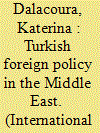

|
|
|
|
|
| Summary/Abstract |
Power projection, security, pragmatic considerations and a disparate mix of national interests and narrower party-political objectives have driven the foreign policy of Turkey's Justice and Development Party (AKP) in the Middle East since it came to power in 2002. Ideological concerns, consisting of a fluid blend of Islamist, neo-Ottoman and ‘civilizationalist’ ideas, mingled with a hefty dose of Turkish nationalism, have played a variable, auxiliary but none the less significant role. The Arab uprisings of 2011 opened up opportunities for the AKP to pursue its ideological objectives and they became more central to its policies, if only in some areas or clusters of relationships. However, they receded after 2015, when a confluence of domestic and regional factors caused the onset of a transactional, ‘post-ideological’ phase. The article places the Middle East in the wider context of Turkish foreign policy, both historically and in comparison with other regions, arguing in the process that categories of ‘East’ and ‘West’ are of limited value for its proper understanding and interpretation. It then divides it into four sub-regions, distinct in geographical and issue terms: Syria and Iraq (the ‘near abroad’), the wider Arab world, Israel–Palestine, and Iran. It analyses Turkish foreign policy towards them in sequence, illustrating the ways in which power-political considerations have predominated in all, albeit in different ways and to varying degrees, over the past five years.
|
|
|
|
|
|
|
|
|
|
|
|
|
|
|
|
| 16 |
ID:
179817
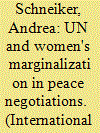

|
|
|
|
|
| Summary/Abstract |
Although UN Security Council Resolution 1325 calls for increased participation of women in all stages of a peace process, the number of women who participate in formal peace negotiations is still very limited. In order to augment their number, UN Women and other international organizations have published a series of policy reports in which they argue that women's participation increases the success of peace negotiations and leads to more inclusive peace agreements. However, based on an analysis of relevant policy reports and interviews with women and men involved in peace negotiations, I argue that the policy reports do not lead to women's empowerment. Instead, they contribute to women's marginalization in peace negotiations, because they entrap women between conflicting expectations. The type of behaviour that international advocates of the Women, Peace and Security (WPS) agenda expect of women when they participate in peace negotiations limits the women's room for manoeuvre—at best. At worst, this type of behaviour prevents women from participating in the negotiations, because it is dismissed by domestic (male) negotiators. But if women who participate in peace negotiations violate the behavioural script proposed by the policy reports, they are considered as not acting in line with the WPS agenda. Hence, no matter how women behave when they sit at the negotiation table, they either lose the support of international or national gatekeepers.
|
|
|
|
|
|
|
|
|
|
|
|
|
|
|
|
| 17 |
ID:
179810
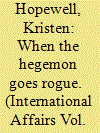

|
|
|
|
|
| Summary/Abstract |
Under President Trump, the United States abdicated its traditional leadership role in the trading system, abandoning multilateralism for aggressive unilateralism and launching an active assault on the World Trade Organization (WTO). Most strikingly, the US blocked appointments to the Appellate Body, jeopardizing the WTO's dispute settlement mechanism. With the trade regime in crisis, a key question has been whether other states would have the will and capacity to lead system-preserving initiatives. While most attention has focused on whether China—widely seen as the chief hegemonic challenger to the US—would assume the mantle of leadership, there has been considerable scepticism about the European Union's capacity to exercise leadership amid the crisis. The EU has generally been seen as punching below its weight in terms of leadership at the WTO. In this article, however, I argue that it is the EU, rather than China, that has taken the lead in advancing concrete initiatives directed at defending and maintaining the multilateral trading system. The EU led the creation of an interim appeals arrangement to replace the defunct Appellate Body—in effect, creating an ‘Appellate Body minus the US’. Although the rules-based multilateral trading system remains under threat, it is the EU, not China, that is acting as a system-preserving power, leading efforts to defend the established order.
|
|
|
|
|
|
|
|
|
|
|
|
|
|
|
|
|
|
|
|
|